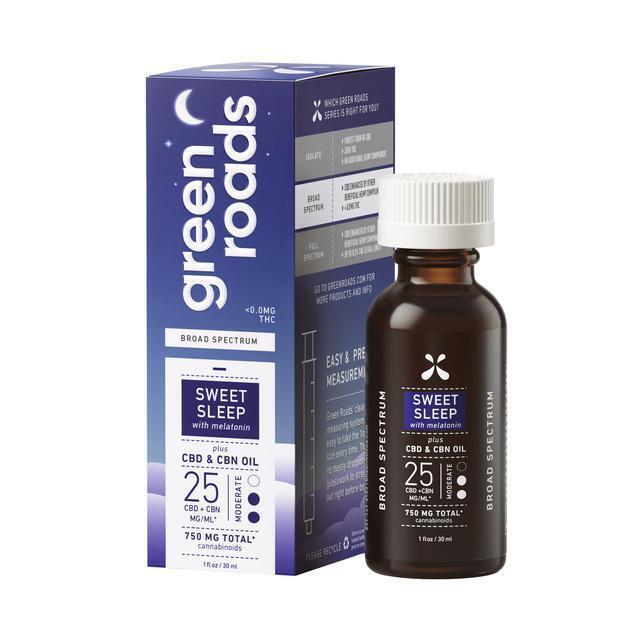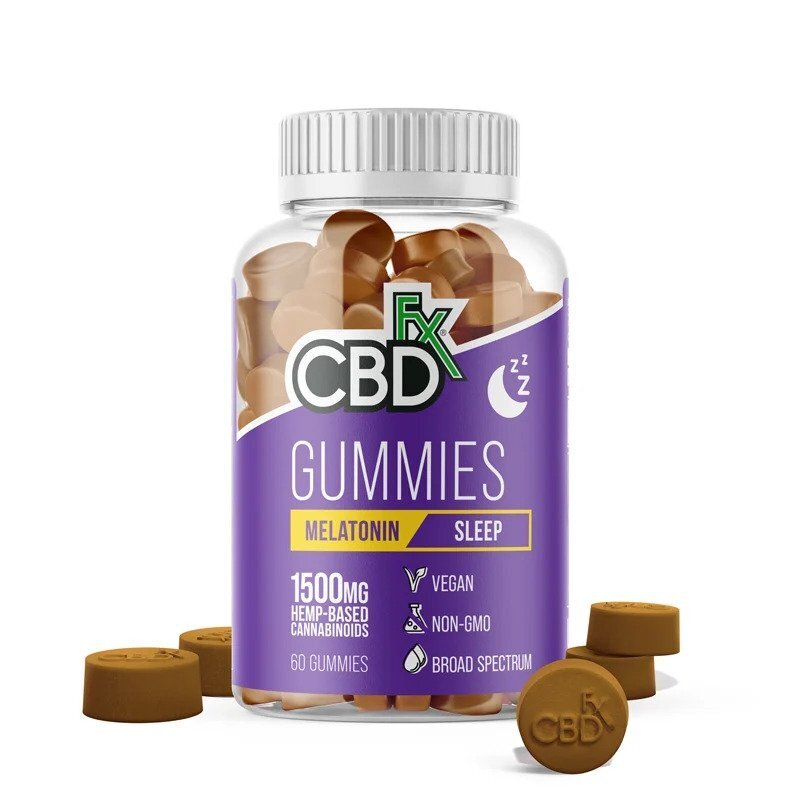We’ve all dealt with occasional sleeplessness and other sleep-related issues. However, when these problems become a regular occurrence, you may be suffering from a sleep disorder, such as insomnia.
While these conditions can be treated, standard medications often come with unwanted side effects and cannot be used long-term.
“CBD interacts with the endocannabinoid system, which is known to regulate the sleep-wake cycle.”
Besides, many drugs only treat the symptoms of sleep disorders — such as difficulty falling asleep — rather than the underlying causes. As a result, there’s increasing interest in alternative, natural solutions like the cannabis plant and cannabidiol (CBD).
There’s some evidence that CBD can help with insomnia and other sleep disorders, particularly by targeting their underlying causes. Read on for a look at what researchers say about CBD for sleep.
Sleep Disorders Overview
Sleep disorders affect your sleeping patterns and make it difficult to get the right amount of quality sleep. They can decrease the quality of life and harm your overall health, particularly through sleep deprivation.
There are many types of sleep disorders, but insomnia — difficulty falling and staying asleep — is the most common. Sleep disorders typically manifest as excessive daytime drowsiness due to a lack of quality sleep at night.
There are many types of sleep disorders, but insomnia — difficulty falling and staying asleep — is the most common. Sleep disorders typically manifest as excessive daytime drowsiness due to a lack of quality sleep at night.
Sleep Disorder Subtypes
Sleep disorders can be grouped into several types: ¹
- Insomnia: the most common type of sleep disorder, characterized by difficulty falling and staying asleep.
- Breathing related sleep disorders: sleep apnea and other disorders linked to difficulty breathing during sleep.
- Hypersomnia: conditions such as narcolepsy and idiopathic hypersomnia that make it difficult to stay awake during the day. People with these disorders can fall asleep at any time.
- Parasomnia: disorders characterized by abnormal behaviors when you’re falling asleep, sleeping, or waking up, such as sleepwalking and sleep terrors.
- Circadian rhythm sleep disorders: sleep disorders where your body’s internal 24-hour sleep-wake clock is out of sync with your environment’s light-dark cycle, causing you to feel disoriented and sleepy.
- Sleep Movement disorders: conditions that make it difficult to get restful sleep by causing movements, such as restless leg syndrome and bruxism.
Sleep Disorder Symptoms & Pathology
The most common symptom of sleep disorders is excessive daytime sleepiness and associated problems such as difficulty concentrating, irritability, and feeling very tired.
Depending on the exact type, sleep disorders can also cause movement during sleep, irregular breathing, and other issues.
Can CBD Help With Sleep Disorders?
Alleviating insomnia and improving overall sleep quality is one of the most common reasons people turn to CBD products. What’s so promising about CBD is that it seems to work by tackling the underlying causes of sleep disorders instead of just their symptoms.
For example, anxiety, depression, and other conditions such as post-traumatic stress disorder, are known to either cause or contribute to insomnia and other sleep problems. ² ³
Preliminary studies have suggested that CBD may help alleviate anxiety, post-traumatic stress disorder (PTSD), and possibly have antidepressant-like effects as shown in a mouse study. ⁴ ⁵
That means people whose sleep issues are related to these conditions can potentially benefit from CBD. Anxiety, in particular, is one of the leading causes of insomnia.
Similarly, chronic pain is another reason many people struggle to get good sleep. In this case, CBD’s pain-relieving properties may be beneficial. ⁶
Another interesting finding is that CBD may have a biphasic effect on sleep. This means that low doses of CBD at certain times may actually promote wakefulness, as demonstrated by a study in rats. ⁷ Furthermore, higher doses of CBD may act as a sedative, as shown by a small study on humans, where 160 mg doses increased total sleep time and reduced sleep disturbances. ⁸
These preliminary findings merit further research to confirm whether CBD can be taken at night to promote sleep or be used in lower doses during the day to counteract the excessive daytime sleepiness caused by most sleep disorders.
Not to mention, it’s unclear how much of an effect other hemp plant properties – such as flavonoids and terpenes – have on sleep.
The Endocannabinoid System and Sleep
We also know that the body’s endocannabinoid system (ECS) plays an important role in regulating the sleep-wake cycle.
This crucial system helps your body maintain a balanced state called homeostasis by regulating a wide range of essential processes, such as immunity, metabolism, and brain function. ⁹
The ECS consists of endocannabinoids made in our bodies, the enzymes that build and break them down, and the cannabinoid receptors (CB1 & CB2) they activate.
The most popular theory is that the ECS plays a role in the effects of the suprachiasmatic nucleus — the part of the brain which controls an individual’s 24-hour circadian rhythm — on sleep and other processes. ¹⁰ This means the ECS may help maintain and promote sleep.
Researchers are working hard to clarify the connection between the ECS and sleep. A study in rats revealed that the levels of endocannabinoids, their associated enzymes, and even cannabinoid receptors appear to fluctuate throughout the day, with a marked difference between the day and night. ¹¹
The results from a study of healthy humans showed that levels of the endocannabinoid anandamide are three times higher when waking up versus going to sleep and that this relationship is dysregulated by sleep deprivation. ¹²
Furthermore, there’s evidence that activation of CB1 receptors via tetrahydrocannabinol (THC) — the main intoxicating cannabinoid — can promote sleep. This may begin to describe the correlation between people feeling sleepy after taking cannabis with high levels of THC. ¹³
A study in rats also found a strong correlation between the light-dark cycle, sleep, and levels of ECS components. Specifically, CB1 receptor density increased in the pons area of the brain during REM rebound — the period of increased REM sleep that follows sleep deprivation. ¹⁴
Taken together, all of these findings suggest that our endocannabinoid system plays an important role in regulating our sleep cycle and making sure we get enough sleep.
Since more and more evidence is showing how CBD can interact with this system in various ways (e.g., by suppressing the enzyme that breaks down anandamide, altering the function of the CB1 receptor), CBD may provide a possible avenue to help with sleep disorders and simply getting a good night’s rest. ¹⁵ ¹⁶
What Does the Research Say?
There’s a growing volume of human research suggesting that CBD can help with sleep disorders.
One 2019 study out of Colorado looked at the effects of CBD on 72 people with anxiety and poor sleep. CBD decreased anxiety in 79% of the study participants for all three months of treatment.
Sleep was improved in 67% of the subjects during the first month but fluctuated for the remaining two months. ¹⁷
A different study of 21 adults with PTSD reported that 38% experienced improvements in sleep after taking CBD. ¹⁸
There are also multiple case reports of individuals who improved their sleep by taking CBD.
One such report discussed the cases of four Parkinson’s disease patients with REM sleep behavior disorder (RBD), a type of parasomnia characterized by acting out vivid, violent dreams during rapid eye movement (REM) sleep.
All four patients experienced a significant improvement in RBD after taking CBD. ¹⁹
Another case report discussed a woman with restless leg syndrome (RLS) who relieved her symptoms and improved sleep by using CBD oil. ²⁰ Finally, a case report of a ten-year-old girl with PTSD noted that CBD oil improved her insomnia. ²¹
In short, the available human research evidence of CBD’s positive effects on sleep disorders is promising. Having said that, there’s a lack of high-quality evidence and the type of rigorous research needed like randomized controlled trials (RCTs), to confirm findings and provide specific therapeutic guidance on the use of CBD for improving sleep.
There’s some evidence that CBD can help with insomnia and other sleep disorders, particularly by targeting their underlying causes.
How Much CBD Should I Take for Sleep?
There’s no consensus on what’s the right amount of CBD for sleep. There simply isn’t enough research in this area.
Besides, your ideal CBD dosage for sleep or any other issue depends on many variables, such as body weight, genetics, symptom severity, and the type of product you’re using. As such, it’s hard to suggest a CBD dosage that will work for everyone.
If you’re new to CBD, it’s best to start with a small dose (10 – 25 mg of CBD) and see how it makes you feel. If you don’t notice any effect, you should gradually raise the dosage over a few hours or days, making sure to stop in between doses to see if you feel any of the potential health benefits.
Once you find the CBD dose that provides you with the relief you’re looking for, stick to it. Also, keep in mind that it’s best to take CBD about 20-60 minutes before sleep to give it time to start working.
Some products (including tinctures and CBD gummies for sleep) make it easier to measure out doses. We highly suggest finding a CBD product that’s designed for sleep aid. If you’re looking for THC-free options, you’ll likely prefer broad-spectrum CBD to other extract types.
Furthermore, the best CBD for sleep products usually incorporates other ingredients, such as melatonin. If you plan on taking such a product, we recommend doing some research on how these other ingredients may affect you. You can find these ingredients on a product label.
Are There Any Side Effects?
According to numerous research studies, CBD is a generally safe substance with few side effects and was even tolerated well at daily dosages as high as 1500 mg. ²²
Although CBD can cause issues such as tiredness, drowsiness, diarrhea, dry mouth, low blood pressure, dizziness, and changes in appetite or weight, these effects are relatively mild and have only been reported by studies using very high doses of pure CBD (300 mg and up). ²³
Most people take no more than 100 mg of CBD at a time, so they’re unlikely to experience these side effects. Additionally, instead of pure CBD, many individuals use whole-plant, full-spectrum CBD extracts which have been shown to have a lower risk of side effects. ²⁴
Conclusion
Although more high-quality research is needed, early findings suggest that CBD oils can have a beneficial effect on sleep problems and full-on sleep disorders such as insomnia.
This isn’t all that surprising as CBD:
- Interacts with the endocannabinoid system, which is known to regulate the sleep-wake cycle.
- May improve many of the health issues that can cause or worsen sleeping problems, such as chronic pain, anxiety, and depression.
Although figuring out the right CBD dosage can take some experimentation, CBD is a safe, natural substance with few and minor side effects.
In comparison, many of the prescription medications used for sleep disorders cannot be used in the long term due to significant adverse effects and the possibility of addiction and withdrawal. Not to mention, CBD for sleep products are often made with a number of other sleep-promoting all-natural ingredients, such as melatonin.










